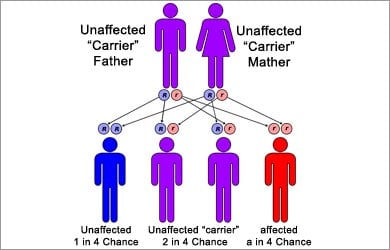Causes of Sickle Cell Anemia
Sickle cell anemia is a genetic disease and is caused by a mutation in the gene that tells the body to make hemoglobin.
Sickle cell anemia is caused by a mutation in the gene that tells the body to make hemoglobin.
Sickle cell anemia (SCA) patients inherit two copies of the abnormal gene, one from each of their parents. Hence it is known as a genetic or hereditary disease.
The sickle cell gene is passed on to generations in an autosomal recessive mode of inheritance, which means that both the mother and the father must pass on the defective form of the gene for a child to be affected by sickle cell anemia.

If only one parent passes the sickle cell gene to the child, that child is a carrier of sickle cell anemia, which means they can pass the defective gene on to the next generation. This condition is called as ‘sickle cell trait’.
People with the sickle cell trait have one normal hemoglobin gene and one defective form of the gene. They make both normal hemoglobin and sickle cell hemoglobin. Their blood may contain some sickle cells, but they generally do not experience symptoms of sickle cell anemia, and are able to lead normal lives. However, they are carriers of the disease.
The inheritance of sickle cell anemia is as follows-
If both parents have sickle cell trait i.e. each has one normal hemoglobin gene and one sickle cell gene, the child has-
- 50% chance of inheriting one normal gene and one sickle cell gene, resulting in a sickle cell trait
- 25% chance of inheriting two sickle cell genes, thereby suffering from the disease
- 25% chance of not inheriting either of the defective gene, thereby being normal
If one parent has sickle cell trait i.e. one normal gene and one sickle cell gene and the other parent is normal i.e. has no such genes, the risks are as follows-
- 50% chance of inheriting sickle cell trait
- 50% chance of being normal i.e. two normal genes with no risk of inheriting sickle cell disease or trait.
If one parent has sickle cell disease i.e. two sickle cell genes and the other parent has sickle cell trait i.e. one normal gene and one sickle cell gene, the child’s risks are as follows-
- 50% chance of inheriting sickle cell trait.
- 50% chance of inheriting sickle cell disease.
If one parent has sickle cell disease and the other parent has two normal hemoglobin genes, the child has a-
- 100% chance of inheriting sickle cell trait, and therefore will be a carrier
If both parents have sickle cell disease, the child has a-
- 100% chance of inheriting the disease.
















